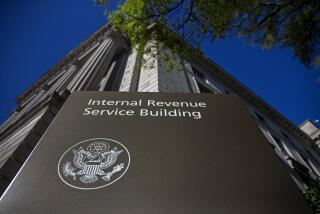TAX WATCH : Retro Wrong
- Share via
What time is it? Well, by one measurement it’s 1040, or 1040EZ for those with the simpler tax form. But if the April 15 deadline is clear, the certainty of allowable deductions is not. The federal government is arguing that Congress can change the rules in the middle of the game. That is unfair and bad policy.
The U.S. Supreme Court two weeks ago asked a number of common-sense questions that led observers to think the justices believe the government has it wrong in the case of U.S. vs. Carlton, and perhaps on the whole issue of tax retroactivity.
Jerry Carlton, a Newport Beach tax lawyer, filed a tax return in 1986 for the estate of an oil heiress, taking advantage of a tax law change made that year. The next year, Congress retroactively repealed the deduction involved and the Internal Revenue Service billed the estate, which wound up losing $630,000. A federal appeals court backed Carlton; the government took the case to the Supreme Court.
A Justice Department lawyer argued that taxpayers should be prepared for retroactive changes, and, besides, the 1986 provision allowing the deduction “was too good to be true.”
That’s preposterous. We need some degree of certainty in all laws, including the tax code, even though the Supreme Court has long interpreted the Constitution’s ban on retroactive laws as applying to criminal laws, not civil.
Lawyers do agree that when the court does rule, it will not tamper with last summer’s tax hikes, retroactive to the previous January. We all have to pay that bill next month.
More to Read
Inside the business of entertainment
The Wide Shot brings you news, analysis and insights on everything from streaming wars to production — and what it all means for the future.
You may occasionally receive promotional content from the Los Angeles Times.









